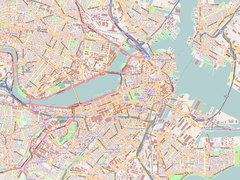John Joseph Moakley Federal Courthouse
| John Joseph Moakley United States Courthouse | |
|---|---|

The Courthouse as seen from the Boston waterfront.
|
|
|
Location within Boston
|
|
| General information | |
| Status | Complete |
| Type | Federal Courthouse |
| Address | 1 Courthouse Way, Boston, Massachusetts 02210 United States |
| Coordinates | 42°21′14″N 71°2′49″W / 42.35389°N 71.04694°WCoordinates: 42°21′14″N 71°2′49″W / 42.35389°N 71.04694°W |
| Elevation | 0 feet (0 m) Above mean sea level |
| Current tenants | • United States Court of Appeals for the First Circuit • United States District Court for the District of Massachusetts |
| Completed | 1999 |
| Cost | $170 million |
| Owner | United States |
| Technical details | |
| Floor count | 10 |
| Floor area | 675,000 square feet (62,700 m2) |
| Design and construction | |
| Architecture firm | Pei Cobb Freed & Partners |
| Structural engineer | LeMessurier Consultants |
| Main contractor | Clark Construction Group, Inc |
The John Joseph Moakley United States Courthouse is a federal courthouse for the United States Court of Appeals for the First Circuit and the United States District Court for the District of Massachusetts, located on Fan Pier on the Boston, Massachusetts waterfront. Named after Congressman Joe Moakley, the 675,000-square-foot (62,700 m2) building was completed in 1999 at a cost of $170 million and has won many design awards.
The courthouse is served by a stop on Boston's Silver Line.
The courthouse serves as headquarters for the United States Court of Appeals for the First Circuit and the United States District Court for the District of Massachusetts. The building houses two courtrooms for the Court of Appeals and 25 courtrooms for the District Court, as well as 40 judges' chambers, a Circuit law library, the office of a United States Congressman, offices for the United States Attorney, extensive support facilities for the United States Marshals service and Pre-Trial and Probation services, as well as a day-care facility. The 675,000-square-foot (62,700 m2) building, clad in water-struck brick with granite trim, has ten floors above grade and one below.
It was the first major project to be awarded as part of the United States Court Design Guidelines and incorporates General Services Administration's goals for imparting dignity and social significance, while creating modern and innovative justice architecture.
...
Wikipedia

